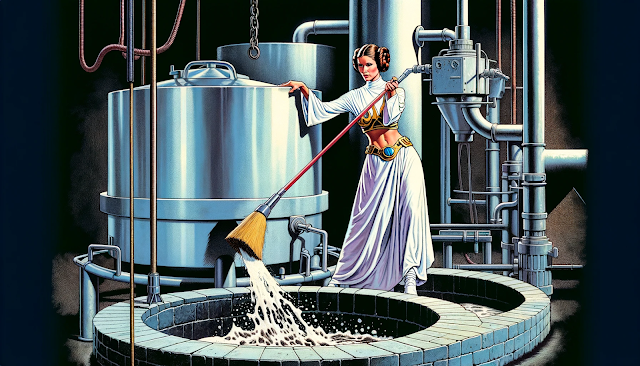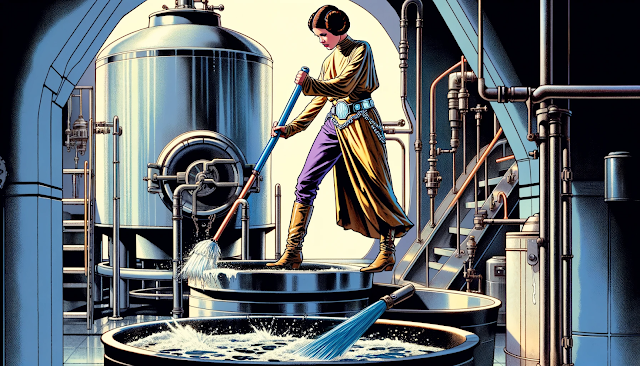B.
W.
Powdered.
Brewery.
Wash.
Powdered Brewery Wash by 5 Star is one of the greatest beer equipment cleaning chemical agents for home brewers.
Any brewer 'worth their wort' knows that their beer brewing equipment needs to be clean before making that next batch of beer.
You simply can't start cooking in your kettle or dump into your mash done with any gunk hanging around - Who knows what germs and nasties could be lingering around on your gear?
PBW is a whiz at removing stains, sediments, and those bits of malt mix that just seem to be stubbornly hanging around.
Let's rattle those pots and pans!
PBW is highly effective for soaking brewing kettles and pots, especially when dealing with challenging residues. If you've overlooked the task of cleaning out the trub from your brewing kettle, and it has hardened into a stubborn, caked-on layer, PBW can be your go-to solution.Simply mix some PBW with water in the kettle, and let it soak. After a thorough soak, the trub should loosen up, making it much easier to clean off. A hose can be particularly effective in rinsing away the loosened gunk.
PBW is also invaluable for addressing beer stone accumulation inside your kettle. Beerstone, a deposit formed from calcium oxalate and various salts found in water, can gradually impair the performance of your kettle. Regular soaks with PBW help in maintaining the kettle by effectively removing this buildup.
PBW is also invaluable for addressing beer stone accumulation inside your kettle. Beerstone, a deposit formed from calcium oxalate and various salts found in water, can gradually impair the performance of your kettle. Regular soaks with PBW help in maintaining the kettle by effectively removing this buildup.
So how do I know PBW works?
Trusting whether PBW actually works as a cleaner comes down to two things - is it actually used by home brewers and what's the science of the wash?
What are the active ingredients of Powdered Brewery Wash?
There are three key parts:Sodium Metasilicate: This compound is an alkaline cleaning agent that helps in breaking down organic matter. It works by saponifying fats and oils, turning them into soap, which can then be easily rinsed away. Sodium metasilicate also aids in breaking down proteins and carbohydrates that are commonly found in brewing residues.
Sodium Percarbonate: Acting as an oxidizing agent, sodium percarbonate is essentially a combination of sodium carbonate (soda ash) and hydrogen peroxide. When dissolved in water, it releases hydrogen peroxide, which helps in breaking down organic stains and sanitizing surfaces. The effervescence caused by the release of oxygen helps to lift and remove soils from surfaces.
Chelating Agents: PBW contains chelating agents like EDTA (Ethylenediaminetetraacetic acid) or similar compounds. These agents are crucial for dealing with water hardness, as they bind to metal ions (like calcium and magnesium) that are found in hard water. By binding these ions, chelating agents prevent them from interfering with the cleaning action and help in removing mineral deposits that can form scale.
Is PBW a no rinse cleaner?
PBW (Powdered Brewery Wash) is not classified as a "no-rinse" cleaner. While it is highly effective in cleaning and removing a wide range of organic and inorganic residues from brewing equipment and other surfaces, it requires thorough rinsing after use. The reason for this is that PBW, being an alkaline cleaner, can leave behind residues if not rinsed properly.
These residues could potentially affect the taste of the beer or other beverages being produced and may also have a negative impact on the long-term integrity of the equipment.
Therefore, after using PBW, it is essential to rinse the equipment thoroughly with clean water to ensure that all traces of the cleaner are removed. This step is crucial in maintaining the quality and safety of the brewing process, as well as preserving the condition of the brewing equipment. Failure to rinse properly could lead to off-flavors in the beer and could also harm the equipment over time.

How does PBW work scientifically?
The alkaline nature of PBW helps to break down organic materials like proteins, oils, and carbohydrates. These compounds are common in brewing residues, and their breakdown is essential for effective cleaning. The alkalinity disrupts the molecular structure of these organic substances, making them soluble in water and easier to rinse away.The release of oxygen from sodium percarbonate has a dual function. It aids in breaking down organic stains (oxidizing) and has a mild sanitizing effect. The effervescent action helps to dislodge and lift soils from surfaces, ensuring a more thorough cleaning.
The presence of chelating agents in PBW is particularly important in areas with hard water. These agents bind to calcium and magnesium ions, preventing them from forming scale or soap scum, which can be difficult to remove. This action ensures that the cleaner remains effective even in hard water conditions.
What kind of people use PBW?
Smart people.
The key users of PBW include:
Homebrewers: One of the most common users of PBW are homebrewers. These individuals, passionate about crafting their own beer at home, find PBW invaluable for cleaning their brewing equipment, such as kettles, fermenters, bottles, and kegs. The effectiveness of PBW in removing organic residues and beerstone makes it a preferred choice for maintaining cleanliness and hygiene in their brewing processes.
Craft Breweries: Small to medium-sized craft breweries also utilize PBW for equipment cleaning and maintenance. In these settings, maintaining a high level of sanitation is crucial for quality control and consistency in beer production. PBW's ability to handle tough residues and its compatibility with a range of materials make it a practical choice for these breweries.
Commercial Breweries: Larger commercial breweries may also use PBW or similar alkaline cleaning agents. In these environments, where there is a high volume of brewing equipment and large-scale production, the need for efficient and effective cleaning solutions is paramount.
Wine and Cider Makers: Beyond beer brewing, PBW is also used by individuals and businesses involved in making wine and cider. The cleaning challenges in these industries are similar to those in beer brewing, and PBW's versatility makes it suitable for use in cleaning fermenters, tanks, and other equipment used in wine and cider production.
Cheese and Dairy Producers: In some cases, PBW is used in cheese and dairy production facilities for cleaning equipment. The food-safe nature of PBW, when rinsed properly, makes it suitable for use in environments where hygiene and cleanliness are critical.
Food and Beverage Industry: Other areas of the food and beverage industry, including restaurants and commercial kitchens, may use PBW for cleaning various types of equipment. Its effectiveness in removing grease, baked-on residues, and other food-related soils makes it useful in these settings.
Laboratories and Research Facilities: PBW can also be found in laboratories and research facilities where glassware and other equipment require thorough cleaning without leaving residues that could interfere with experiments or tests.
Homebrewers: One of the most common users of PBW are homebrewers. These individuals, passionate about crafting their own beer at home, find PBW invaluable for cleaning their brewing equipment, such as kettles, fermenters, bottles, and kegs. The effectiveness of PBW in removing organic residues and beerstone makes it a preferred choice for maintaining cleanliness and hygiene in their brewing processes.
Craft Breweries: Small to medium-sized craft breweries also utilize PBW for equipment cleaning and maintenance. In these settings, maintaining a high level of sanitation is crucial for quality control and consistency in beer production. PBW's ability to handle tough residues and its compatibility with a range of materials make it a practical choice for these breweries.
Commercial Breweries: Larger commercial breweries may also use PBW or similar alkaline cleaning agents. In these environments, where there is a high volume of brewing equipment and large-scale production, the need for efficient and effective cleaning solutions is paramount.
Wine and Cider Makers: Beyond beer brewing, PBW is also used by individuals and businesses involved in making wine and cider. The cleaning challenges in these industries are similar to those in beer brewing, and PBW's versatility makes it suitable for use in cleaning fermenters, tanks, and other equipment used in wine and cider production.
Cheese and Dairy Producers: In some cases, PBW is used in cheese and dairy production facilities for cleaning equipment. The food-safe nature of PBW, when rinsed properly, makes it suitable for use in environments where hygiene and cleanliness are critical.
Food and Beverage Industry: Other areas of the food and beverage industry, including restaurants and commercial kitchens, may use PBW for cleaning various types of equipment. Its effectiveness in removing grease, baked-on residues, and other food-related soils makes it useful in these settings.
Laboratories and Research Facilities: PBW can also be found in laboratories and research facilities where glassware and other equipment require thorough cleaning without leaving residues that could interfere with experiments or tests.
This wide group of users can give you confidence that this cleaner is a tried and true product, one worth your time considering.
List of some alternative uses for PBW (Powdered Brewery Wash) beyond cleaning beer brewing equipment:
- Wine and Cider Making Equipment: Cleaning fermenters, barrels, bottles, and other equipment used in wine and cider production.
- Cheese Making Tools: Sanitizing cheese vats, molds, presses, and other utensils involved in cheese production.
- Coffee Equipment: Removing coffee oils and residues from espresso machines, coffee pots, and grinders.
- Restaurant and Commercial Kitchen Gear: Cleaning ovens, grills, fryers, and other heavy-duty kitchen equipment with tough, baked-on grease and food residues.
- Home Kitchen Appliances: Deep cleaning of stovetops, ovens, microwaves, and other appliances to remove food spills and stains.
- Glassware and Lab Equipment: In laboratories, for cleaning glassware and equipment to ensure no residues affect experiments or tests.
- Dairy Equipment: Sanitizing milk tanks, pasteurizers, and other equipment in dairy production.
- Bakery Tools: Cleaning mixers, dough sheeters, and baking trays with dough or burnt flour residues.
- Distillery Equipment: For cleaning stills, fermenters, and other distilling apparatus.
- Food Processing Machinery: Sanitizing equipment used in food processing facilities, including conveyors, mixers, and slicers.
- Home Cleaning: Removing hard water stains, soap scum, and mineral deposits from bathroom fixtures, tiles, and shower doors.
- Aquariums and Terrariums: Cleaning algae and mineral buildup on glass and equipment in aquariums and terrariums, ensuring safety for aquatic and reptile life.
- Canning and Preserving Equipment: Sanitizing jars, pots, and utensils used in home canning and preserving processes.
If you're not sold on PBW, here's a list of alternative cleaners you may wish to consider.
- One Step No-Rinse Cleaner: A popular oxygen-based cleaner and sanitizer that is often used as a no-rinse solution for brewing equipment.
- OxiClean Free: A versatile oxygen-based cleaner that is free of perfumes and dyes. It is often used by brewers as a cost-effective alternative for cleaning and removing organic residues.
- Star San: A phosphoric acid-based sanitizer that is commonly used in brewing for sanitizing equipment. While primarily a sanitizer, it also has some cleaning properties.
- Easy Clean: A cleaner and sanitizer that is commonly used in homebrewing. It is chlorine-free and is used for cleaning brewing vessels, bottles, and other equipment.
- Craft Meister Alkaline Brewery Wash: A strong alkaline cleaner specifically designed for brewing equipment. It is effective at removing tough organic deposits and is suitable for use on a variety of materials.
- BTF Iodophor Sanitizer: While primarily a sanitizer, BTF Iodophor can also be used for cleaning. It is an iodine-based solution that is effective against a wide range of microorganisms.
- Diversey Beer Clean Glass Cleaner: This product is specifically designed for cleaning glassware but can also be used for other brewing equipment. It helps in removing lipstick, oils, and other residues from glass surfaces.
- Straight-A Premium Cleanser: An environmentally-friendly cleaner that is effective for removing stains and residues from brewing equipment. It is non-toxic and biodegradable.
- CIP (Clean-in-Place) Cleaners: Various commercial-grade CIP cleaners are available for larger brewing operations. These are specially formulated for cleaning in-place systems in breweries.
Each of these products has its own unique formulation and strengths, and the choice of cleaner depends on the specific needs and preferences of the brewer, as well as the types of equipment being cleaned. It's important to follow the manufacturer's instructions for use and safety when using any cleaning product.




